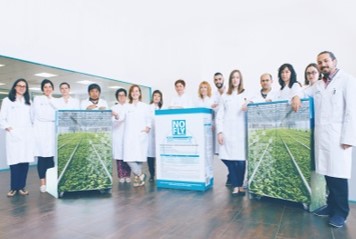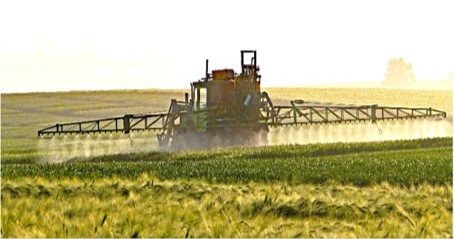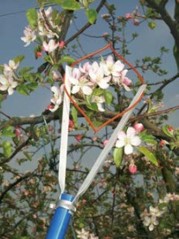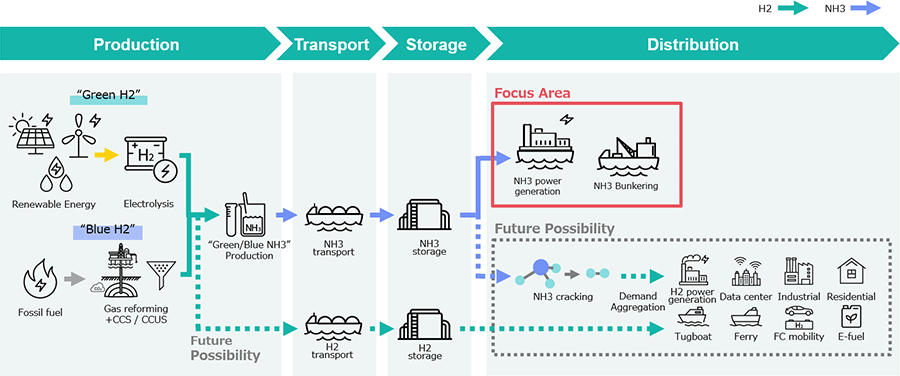View Sumitomo Corporation's Sustainability : Prevention of Pollution
Sumitomo Corporation Groups business covers a wide range of areas around the world. As described in the Environmental Policy, the Group complies with environment-related laws and regulations and contributes to creating a recycling society. We consider it important not only to comply with laws, ordinances and standards to prevent pollution caused by waste water, sludge, exhaust and other wastes but also to reduce environmental impact through waste reduction, reuse and recycling in order to achieve a sustainable society. We will continue to address relevant issues through our business activities.
Our major mission in the realm of agrochemical/fertilizer business is to provide the best-quality agrochemicals/fertilizers that fulfill the needs of farmers worldwide with the aim of contributing to increasing the productivity of agricultural crops. We select and combine functions such as import, manufacturing, distribution, wholesale and direct sales by taking into account the characteristics of each market, and we are currently conducting agrochemical/fertilizer business in about 40 countries.
In some areas, unfortunately, farmers and distributors inappropriately dispose of emptied plastic bottle containers and aluminum bags of agrochemicals, which can pollute the environment. There are also concerns that agrochemical remains in such containers could lead to an accident and adversely affect the environment. Agro Amazonia Produtos Agropecuarios Ltda. in Brazil and Summit Agro Mexico S.A. de C.V. in Mexico involve other companies in the industry to make joint efforts to collect and recycle empty containers of agrochemicals to promote environmental conservation.
Efforts are also made to reduce the environmental impacts of agrochemicals themselves, including investment in Bio-solution manufacture called Futureco Bioscience S.A., in Spain and Bio Insumos Nativa SpA in Chile, and application of integrated pest management (IPM), which does not depend on agrochemicals alone and has low environmental impacts.
As an IPM effort, we are spreading the use of a communication disruptor (pheromone agent) developed by Shin-Etsu Chemical Co., Ltd., which uses insect's natural sex pheromone. It is harmless to non-target organisms, and not only reduces the population of the target pest but is also effective on pests that enter inside plants and are hard to control.
It can also be expected to reduce the pesticide resistance of pests. This control method is currently applied by about 60% of orchards in France. In the European region, we have expanded our sales territory to include Poland, Bulgaria and Turkey.
In addition, we put our efforts into reducing the amount of conventional chemical fertilizer applied and reducing environmental impacts on farmland by expanding the sales of coated fertilizers (allowing farmers to control the pace of fertilizer elution and enhance the effective utilization rate of fertilizer constituents, thereby reducing the amount of fertilizer applied) and biostimulants (which increase plants’ tolerance to diseases and pests as well as to cold/heat stresses by enhancing their innate immunity and vitality, thereby enabling the use of reduced amounts of fertilizer). (equity participation in Naturevo S.R.L, a Romanian company whose main product is such high-performance fertilizers)

Investment in a bio-agrochemical manufacturer in Spain

Agrochemical project in Brazil (Agro Amazonia Produtos Agropecuarios Ltda.)

Use of a pheromone agent
Since 1954, we have been supplying marine fuel to shipping companies in Japan and abroad. To contribute to reductions in the shipping industry’s environmental impact, we are also working to supply LNG fuel, which emits no sulfur oxides and contains 40-70% fewer nitrogen oxides and 20% less carbon dioxide than conventional fuels. Specifically, through a joint venture with Uyeno Transtech Ltd., Yokohama-Kawasaki International Port Corporation, and the Development Bank of Japan Inc., we placed an order for an LNG bunkering vessel to be utilized for LNG fuel supply business in Tokyo Bay.
The International Maritime Organization (IMO), a specialized agency of the United Nations, has formulated a strategy to reduce greenhouse gas (GHG) emissions from maritime transportation globally to zero by around 2050. In this context, it is believed that ammonia will be the next generation of alternative marine fuels that have the potential to contribute significantly to reducing GHG emissions in the shipping industry because it does not emit CO2 during combustion. Green ammonia in particular has the potential to be a major factor in making the shipping industry carbon-free, as it is produced solely from renewable electricity, water, and air and emits no CO2 during its lifecycle.
We are working with A.P. Moller - Maersk A/S and other partners in a joint study on the commercialization of supplying ammonia fuel for ships in Singapore and the east coast of North America. Through this initiative, we aim to contribute to the decarbonization of the shipping industry by creating a comprehensive supply chain that includes the supply, transportation, storage, and bunkering of non-GHG emitting marine fuel.
